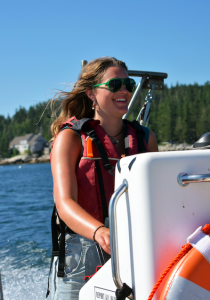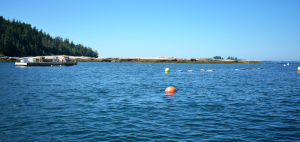Hurricane Island Center for Science and Leadership Immerses ARI Extern Jess Cleary-Reuning in Aquaculture Education
Pier jumps. Trails around rocky shores. Diverse tidal pools. Adventure around every bend. Chilly waters just asking to be explored. Who wouldn’t want to live life “island style”? On Hurricane Island, the wilderness is at Jess Cleary-Reuning’s fingertips.
Through an Aquaculture Research Institute (ARI) externship, UMaine Marine Science major Jess Cleary-Reuning is working for the Hurricane Island Center for Science and Leadership in Rockland, ME.
 After serving as a granite quarry in the 1870’s and a base camp for Outward Bound from 1964 to 2006, Hurricane Island is now the site of the Center for Science and Leadership (HICSL). Since 2009, this educational center has been a home for adventurous students of all ages to learn about the natural world and sustainable, environmental practices. Cleary-Reuning’s mother visited Hurricane Island Outward Bound as a youth in the summer, so exploring HICSL naturally interested Cleary-Reuning.
After serving as a granite quarry in the 1870’s and a base camp for Outward Bound from 1964 to 2006, Hurricane Island is now the site of the Center for Science and Leadership (HICSL). Since 2009, this educational center has been a home for adventurous students of all ages to learn about the natural world and sustainable, environmental practices. Cleary-Reuning’s mother visited Hurricane Island Outward Bound as a youth in the summer, so exploring HICSL naturally interested Cleary-Reuning.
HICSL’s summer programs for adults, students and school groups provide participants with tools for leadership and social change. This summer, Cleary-Reuning works alongside Aquaculture Manager Madison Maier on the Island Ecology and Marine Ecology high school education programs.
“Island Ecology focuses on freshwater and terrestrial ecosystems. Marine Ecology focuses on the tidal zone, learning about the fisheries in the area and our aquaculture farm. Our aquaculture farm started as a Limited Purpose Aquaculture lease site (LPA), and in 2019, we expanded into a full, 3.2-acre experimental farm,” Maier says.
The research farm contains an oyster long line and cages, lantern nets for Atlantic sea scallops, and a wooden platform, referred to as “The Float”, with bolted-down lab tables and a solar panel powering machinery for field work. Students in the Island Ecology and Marine Ecology programs have the opportunity to see the farm, learn how it operates, and observe marine invertebrates.
These educational experiences gained from the summer programs provide training in multiple skills in aquaculture and marine ecosystems, and these are what Cleary-Reuning is observing for her externship. Working at HICSL, Cleary-Reuning gathers data to help the University of Maine Cooperative Extension create youth micro-credentials.

To do this, Cleary-Reuning researched adult micro-credentials already being utilized in order to find ways to build youth micro-credentials. Adult micro-credentials involve a three-level program: level one is gaining knowledge and information from an instructor; level two is hands-on experience and applying knowledge; level three is certifying all experiences and knowledge in the real world. The micro-credential itself is a digital badge earned after the program’s completion and can be placed on an individual’s LinkedIn, Gmail, or resume.
“If you click on it, the micro-credential shows a webpage outlining exactly what that individual did to get that micro-credential. Name, date received, what work was completed, and skills learned and shown. I see it more as a personalized resume addition,” Cleary-Reuning says.
To build micro-credentials for youth, Cleary-Reuning is observing programs at HICSL and deciding which skills and knowledge could be applied to a micro-credential. “I am looking at what we do with the kids and separating the activities between knowledge and skills. The aquaculture tour would be knowledge. Doing scallop measurements and sorting spat would be skills,” Cleary-Reuning says.
Observing education at HICSL has helped Cleary-Reuning define what youth micro-credentials could entail. This summer, students in the High School Marine and Ecology programs did small research projects involving skills such as organizing data, handling invertebrates, creating graphs and charts, writing hypotheses and presenting posters. Each of these skills will be part of a micro-credential for youths who want to study aquaculture or marin

e science in the future. Cleary-Reuning’s time on Hurricane Island allowed a large data set to form and help UMaine create micro-credentials for youths, all while giving Cleary-Reuning time to herself.
“I’ve been scuba diving and learned how to drive skiffs and tie knots. It’s just a really unique living and learning environment. There’s a lot of personal things that I am learning from living here too. It’s not a traditional internship,” Cleary-Reuning says.

